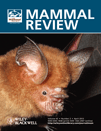
MAMMAL REVIEW
Scope & Guideline
Innovating the Study of Mammals for a Sustainable Future
Introduction
Aims and Scopes
- Ecological and Conservation Biology:
The journal emphasizes the study of mammals within ecological contexts, focusing on their roles in ecosystems, species interactions, and conservation strategies. This includes assessments of population dynamics, habitat use, and the impacts of human activities. - Taxonomy and Phylogenetics:
MAMMAL REVIEW publishes research on the classification, phylogenetic relationships, and evolutionary history of mammalian species, contributing to a better understanding of biodiversity and species conservation. - Human-Wildlife Interactions:
The journal explores the complexities of human-wildlife interactions, including conflicts, disease transmission, and the implications of human activities on mammal populations, which are crucial for effective management and conservation efforts. - Methodological Innovations:
The journal encourages the use of innovative methodologies in mammalian research, such as genetic sampling, acoustic monitoring, and spatial analysis, enhancing data collection and analysis in ecological studies. - Climate Change Impacts:
MAMMAL REVIEW addresses the effects of climate change on mammalian species and ecosystems, highlighting adaptive responses and conservation challenges in changing environments.
Trending and Emerging
- Non-invasive Research Techniques:
There is an increasing emphasis on non-invasive methods for studying mammals, such as genetic sampling and remote monitoring, which reduce stress on wildlife and yield valuable data for conservation. - Anthropogenic Impacts and Responses:
Research focusing on the effects of human activities—such as urbanization, agriculture, and climate change—on mammal populations is on the rise, highlighting the urgent need for conservation strategies that address these challenges. - Ecosystem Services and Functions:
Emerging themes include the study of ecosystem services provided by mammals, such as seed dispersal and habitat engineering, which underscore the ecological importance of species beyond their immediate conservation needs. - Interdisciplinary Approaches:
There is a growing trend towards interdisciplinary research that integrates ecology, genetics, sociology, and economics to address complex conservation issues, reflecting a holistic view of mammalian studies. - Zoonotic Diseases and Public Health:
Research on zoonotic diseases, particularly in light of recent global health crises, has gained prominence, emphasizing the intersection of wildlife health and human health in conservation discussions.
Declining or Waning
- Traditional Taxonomic Reviews:
There has been a noticeable decline in traditional taxonomy-focused studies, as the field shifts towards integrative approaches that combine genetic, ecological, and behavioral data to understand species relationships and classifications. - Generalized Habitat Studies:
Research focusing solely on broad habitat descriptions without specific ecological or conservation implications appears to be waning. The journal now favors studies that connect habitat characteristics with species management and conservation outcomes. - Historical Biogeography without Modern Context:
While historical biogeography remains a relevant theme, there is a decrease in studies that do not link past distribution patterns to current conservation challenges or ecological dynamics. - Single-Species Focus:
Research focusing exclusively on single species without considering broader ecological interactions or community dynamics has become less common, as the journal increasingly emphasizes interconnectedness in ecosystems. - Descriptive Studies without Conservation Implications:
There is a decline in purely descriptive studies that do not address conservation implications, reflecting a broader trend towards research that informs practical conservation and management strategies.
Similar Journals
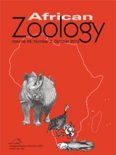
AFRICAN ZOOLOGY
Championing Conservation Through ResearchAFRICAN ZOOLOGY, published by Taylor & Francis Ltd, stands as a significant journal in the realm of Animal Science and Zoology, with a proud history dating back to 1996 and slated to continue until 2024. With an ISSN of 1562-7020 and E-ISSN 2224-073X, this journal provides a reputable platform for researchers and practitioners dedicated to the study of animal biology across the African continent. It has been recognized for its quality scholarship, evidenced by its Q3 categorization in the 2023 Scopus quartile rankings and an impressive rank of #182 out of 490 within its field. As an open-access journal, it facilitates the dissemination of vital research findings and promotes broader accessibility, catering to a diverse audience of professionals, scholars, and students alike. The journal aims to enhance our understanding of wildlife, conservation, and ecosystem dynamics in Africa, fostering collaborations that address critical ecological challenges. For researchers and enthusiasts keen on contributing to and staying informed about advancements in zoological science, AFRICAN ZOOLOGY is an essential resource that enriches the global discourse on biodiversity and conservation efforts.

ANNALES ZOOLOGICI FENNICI
Pioneering Discussions in Zoological ConservationANNALES ZOOLOGICI FENNICI, published by the Finnish Zoological Botanical Publishing Board, is a prominent scientific journal dedicated to advancing the fields of Animal Science, Zoology, Ecology, Evolution, Behavior, and Systematics. Based in Finland and serving an international audience, this journal has been an essential resource since its inception in 1974, offering valuable insights into biodiversity, conservation, and ecological dynamics. While it holds a respectable Q3 quartile ranking across several relevant categories in 2023, its impactful contributions to the scientific community continue to promote critical discussions and foster research collaborations. Although the journal is not currently open access, its robust indexing in Scopus and recognition within the academic community underscore its significance. As a researcher, professional, or student, engaging with the ANNALES ZOOLOGICI FENNICI not only enriches your knowledge but also aligns you with the forefront of zoological research and conservation studies.
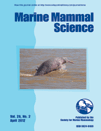
MARINE MAMMAL SCIENCE
Unraveling the mysteries of marine mammal behavior and biology.MARINE MAMMAL SCIENCE, published by Wiley, is a premier journal dedicated to advancing the field of marine mammal research since its inception in 1985. With an impressive impact factor and categorized as Q1 in both Aquatic Science and Ecology, Evolution, Behavior and Systematics, this journal serves as a vital platform for innovative research and findings in marine biology, conservation, and ecology. It ranks 165th out of 721 in the Scopus category of Ecology, Evolution, Behavior and Systematics and 65th out of 247 in Aquatic Science, showcasing its influence and relevance in the academic community. Covering a wide range of topics, from behavior and anatomy to conservation and habitat management, MARINE MAMMAL SCIENCE aims to foster a deeper understanding and promote proactive strategies for the preservation of marine mammals. Researchers, professionals, and students will find invaluable insights and the latest advancements in this journal, contributing significantly to the discourse on marine conservation and ecology.

Diversity-Basel
Transforming knowledge into action for a thriving ecosystem.Diversity-Basel is a premier open-access journal published by MDPI, specializing in the vital fields of agricultural, biological, and ecological sciences. Launched in 2009, this multidisciplinary journal, operating from Switzerland, aims to disseminate high-quality research that advances the understanding of biodiversity and ecosystem dynamics. With an impressive impact factor and notable rankings in Scopus, including Q1 classification in Agricultural and Biological Sciences and strong positions in Ecology and Ecological Modeling, Diversity-Basel stands as a valuable resource for global researchers, professionals, and students alike. Its commitment to accessibility enables researchers to reach a wider audience, fostering collaboration and innovation in addressing pressing environmental challenges. By providing an inclusive platform for diverse scientific inquiries and innovations, Diversity-Basel plays an essential role in shaping the discourse on biodiversity conservation and management, encouraging the pursuit of sustainable solutions in our rapidly changing world.
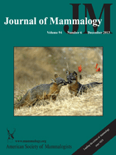
JOURNAL OF MAMMALOGY
Fostering Excellence in Mammal Science and EcologyJournal of Mammalogy, published by Oxford University Press Inc, is a premier journal dedicated to the field of mammalogy, providing a key platform for researchers and professionals interested in the biology, ecology, and conservation of mammals. With a prestigious impact factor reflected in its Q1 ranking in Animal Science and Zoology, and multiple Q2 rankings in related categories such as Ecology and Genetics for 2023, this journal is recognized for its significant contribution to advancing knowledge in the discipline. The journal features rigorous peer-reviewed articles, ensuring high-quality research output valuable for students, academia, and conservation efforts alike. While not an open-access journal, it offers comprehensive subscription options for institutions and individual readers, promoting accessibility to critical findings in the realm of mammal research. Established in the earlier years of the 20th century, the Journal of Mammalogy has continuously evolved, serving as an integral resource for disseminating innovative studies and insights that drive the future of mammalian sciences.
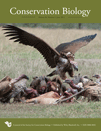
CONSERVATION BIOLOGY
Leading the way in conservation science and practice.CONSERVATION BIOLOGY, published by Wiley, is a leading journal in the field of ecology and conservation, with a focus on disseminating high-quality research that addresses pressing environmental challenges. With a strong impact factor and categorized in the top quartile (Q1) across various relevant fields including Ecology, Evolution, Behavior and Systematics, and Nature and Landscape Conservation, the journal plays a pivotal role in advancing the scientific understanding of biodiversity and conservation practices. Since its establishment in 1987, CONSERVATION BIOLOGY has provided a vital platform for researchers, professionals, and students to share innovative findings and facilitate discussions surrounding ecological sustainability and conservation strategies. Although it is not an open-access publication, it ensures that a wide range of significant research is accessible to the global scientific community. The journal’s rigorous peer-review process and reputation for excellence make it an essential resource for anyone involved in the study of ecology and conservation.
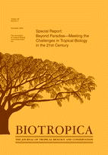
BIOTROPICA
Leading the way in ecological and evolutionary research since 1979.BIOTROPICA is a premier journal published by Wiley, specializing in the fields of Ecology, Evolution, Behavior, and Systematics. With a robust impact factor and positioned in the Q1 category in its field, it stands out as a leading source of research that informs and shapes our understanding of biodiversity and ecosystem management. Since its inception in 1979, BIOTROPICA has been dedicated to publishing high-quality articles that advance scientific knowledge and foster conservation efforts globally. Researchers and professionals alike value the journal for its rigorous peer-review process and its influence in academic discourse, demonstrated by its Scopus ranking placing it in the 70th percentile among its peers. While the journal does not currently offer open access, it continues to be a vital resource for those engaged in the study of biological systems, making significant contributions to the advancement of ecological science. Readers can expect to find a wealth of innovative research and perspectives that are critical to addressing contemporary environmental challenges.

Neotropical Biology and Conservation
Uniting Research and Conservation in the Neotropical RealmNeotropical Biology and Conservation, published by Pensoft Publishers, serves as a pivotal platform for researchers and professionals dedicated to the understanding and preservation of biodiversity in the Neotropical region. This Open Access journal, operational since 2006 and based in Brazil, invites contributions that delve into the complexities of ecology, evolution, and conservation strategies pertinent to the diverse ecosystems of South and Central America. With a commendable 2023 impact factor reflected in its Q3 rankings across multiple categories including Animal Science, Ecology, and Plant Science, it stands as a valuable resource for academics seeking to publish innovative findings and foster dialogue in these critical areas of study. The journal's commitment to open access ensures that knowledge is readily available to anyone interested in advancing the field of neotropical biology and conservation. Join the global conversation and contribute to the vital work of preserving our planet’s rich biological heritage through rigorous research published in this esteemed journal.

POPULATION ECOLOGY
Exploring the intricate dynamics of species and ecosystems.Population Ecology is a leading journal dedicated to the advancement of research in the field of ecology, evolution, and behavior, published by the esteemed Wiley in Japan. With an impact factor indicative of its academic significance and ranked Q2 in the 2023 Ecology category, this journal serves as a pivotal resource for researchers, professionals, and students alike, facilitating the dissemination of high-quality research and innovative discussions. Covering diverse aspects of ecological dynamics, population processes, and their evolutionary implications, Population Ecology fosters a deeper understanding of species interactions and environmental factors shaping ecosystems. Available in both print and online formats (E-ISSN 1438-390X), the journal is committed to open access to enhance public engagement and accessibility to crucial scientific findings, ultimately contributing to informed decision-making regarding biodiversity and conservation efforts. With a robust ranking of #235 out of 721 in Agricultural and Biological Sciences, it is poised to remain at the forefront of ecological research through 2024 and beyond.
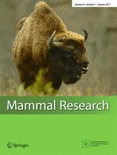
Mammal Research
Advancing the Frontiers of Mammalian ScienceMammal Research, published by Springer Heidelberg, is a prominent academic journal dedicated to advancing knowledge in the fields of Animal Science, Zoology, Ecology, Evolution, and Behavior. With an impressive Q2 ranking in both Animal Science and Zoology and Ecology, Evolution, Behavior and Systematics as of 2023, this journal is an essential resource for researchers and professionals seeking to publish innovative findings that contribute to our understanding of mammalian biology. The journal operates under an Open Access model, allowing a wide audience to access and engage with high-quality research articles. Converging between 2015 to 2024, Mammal Research serves as a vital platform for scholarly discourse, promoting rigorous scientific inquiry and collaboration among experts and students alike in the fascinating study of mammals.